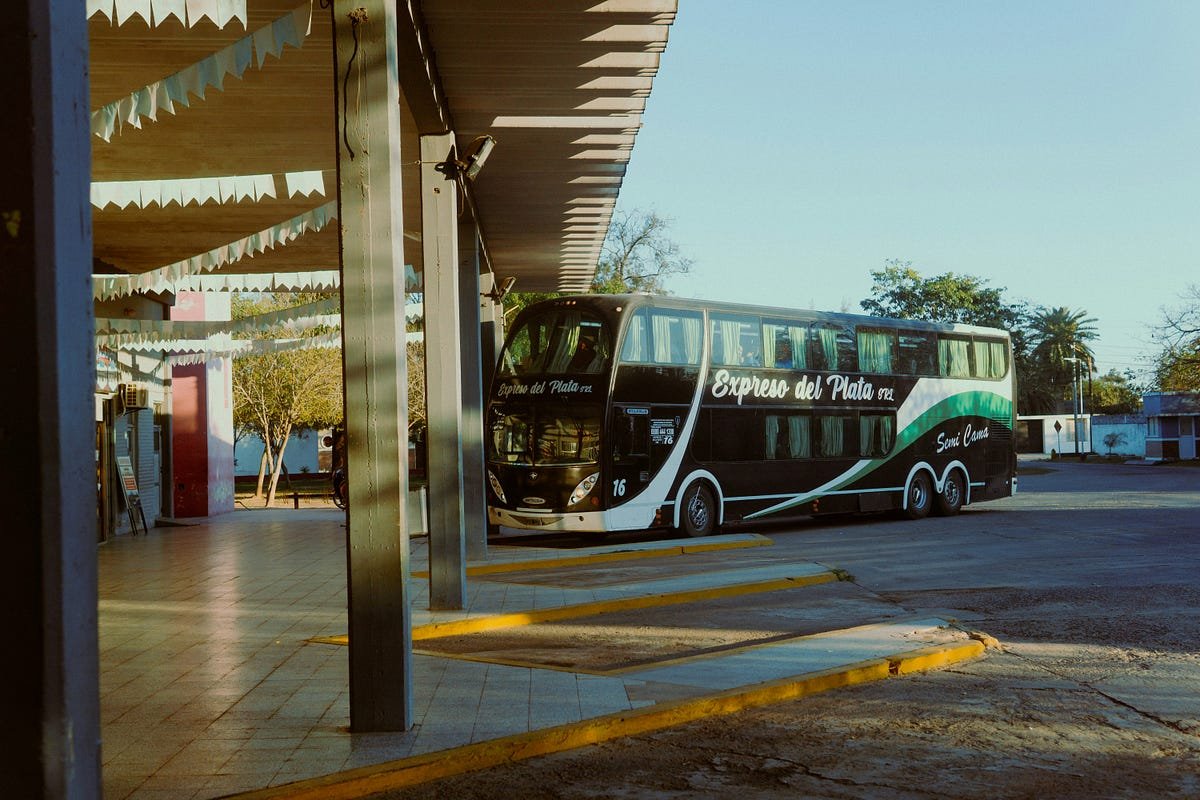Shadows at the Terminal. A tale of fleeting encounters… | by Zi | Sep, 2025

The terminal at Sungai Kunjang always smelled the same—diesel fumes, cigarette smoke, and fried peanuts gone cold. At night, that smell pressed harder, as though the heat of the day had seeped into the cement and refused to leave. A thousand different footsteps echoed under the rusting roof, merging with the sharp cough of bus engines and the impatient shouting of conductors.
I was there not because I had to be, but because I had grown tired of Samarinda again. That happened often. The city with its endless haze of coal dust, its buzzing motorbikes on Jalan M. Yamin, its restless gossip—it never let me breathe for long. Whenever boredom gnawed deep enough, I gave in to my habit. I left. Sometimes to Tenggarong, sometimes to Sangatta. Tonight, I had chosen Balikpapan.
The idea had come that afternoon, sudden and insistent. I’d been staring at the slow brown roll of the Mahakam, thinking how the river carried everything away—trash, logs, oil slicks—never holding anything for long. I envied that. By evening, I was at the terminal, backpack slung across my shoulder, ready to let the night decide where I’d wake up.
I had just settled on a wooden bench near the far wall when she appeared. A woman in a faded gray kerudung, carrying a sleeping boy whose head lolled against her collarbone. She lowered herself beside me, careful not to jostle him. Her face was lined with exhaustion, her eyes darting from a dim notice board—blank schedules, crossed-out destinations—to the dark edges of the hall.
“Is there any bus to Berau from here?” she asked, voice quiet, almost swallowed by the buzz of a flickering lamp above us.
I frowned. “No, not from here at night. I heard buses to Berau run only from the Damri pool during daytime, not from terminal Sungai Kunjang at night.” I saw disappointment flicker in her eyes.
She nodded, almost to herself. “I stayed late hoping… maybe there’d still be one.”
That was how I met Wati.
At first, she spoke in fragments, as though words were stones she had to lift one by one. She told me about the room she had been renting near Pasar Pagi, how the walls sweated in the rain, how her son asked every night if they would ever go home. Then the fragments grew heavier. Her husband had died six months earlier, leaving behind debts tied to the cooperative where he’d worked. On paper, she was a guarantor. In reality, she was a widow drowning in signatures she never understood.
Debt collectors came to her door with rehearsed politeness that broke into threats. Neighbors whispered that she should hand her son to relatives if she couldn’t cope. Her in-laws accused her of dragging the family name into the mud. And through it all, the bills grew, interest curling like vines around every breath she took.
“I trusted him,” she murmured, staring at the sleeping boy in her arms. “He said it was routine, just paperwork. I signed because I loved him. And now—” Her voice cracked. “Now I carry his ghosts.”
The words clung to the air between us, heavy as smoke.
Vendors passed with trays of bottled tea and boiled eggs. I bought two cups of instant coffee and handed her one. She accepted with a nod, careful not to wake her son. The steam curled in the fluorescent light, but it did nothing to ease the chill creeping across her shoulders.
Then I noticed them—two men in leather jackets, lingering by the ticket counter. They didn’t belong. Their shoes were too clean, their eyes too sharp. Debt collectors. They watched Wati the way stray dogs watch meat.
She stiffened when she saw them. “They’ve been following me,” she whispered. “I thought if I came here, maybe one of these buses to Balikpapan would help me escape seeing them. But there’s no bus to Berau tonight. And if they catch me—” Her voice trailed off.
It wasn’t just the collectors. There was more. She told me about a cousin in Berau who had offered help—money, shelter, protection. But she spoke his name with bitterness. The promise came with an unspoken condition, the kind every woman understood. Accepting it would mean surrendering more than her pride.
“I can’t take his help,” she said, jaw tight. “But what choice do I have? If I stay here, the collectors will bleed me dry. If I go home, my cousin will own me. Every road is a wall.”
Her voice trembled, but her eyes were steady, defiant. I felt the words like stones in my chest.
Night deepened in the terminal. The overhead lamps flickered, some lights gone out altogether, leaving patches of darkness where shadows pooled. The people waiting were fewer; some had dozed against the benches, some stared at their phones in a half-wake.
I checked my phone’s clock: nearly midnight. No buses to Berau until the morning, only occasional shuttles to nearby towns. I thought about Wati’s option: wait until sunrise, endure another night of fear and uncertainty. Or find another route. Or flee.
Near midnight, a clerk’s voice echoed: “Balikpapan route, last seat. Leaves in twenty.”
My heart tightened. Balikpapan. The name tasted like possibility.
Wati stood, shifting her son against her shoulder. She looked at me, apology flickering in her gaze. “I can’t wait until morning,” she admitted. “But I also can’t face them if they come now.”
Her sentence withered under the hum of engines.
My pockets were light. My money was almost gone—but I still had enough for a ticket to Balikpapan. Unnecessary, impulsive—but that was my curse. Samarinda’s weight had always pressed on me until I fled. And tonight I felt that weight more than usual.
I pressed the money into her free hand.
“Go,” I said. “While you can.”
Her eyes widened. She opened her mouth as if to protest, then closed it. She nodded once, sharply, and hurried toward the gate.
The collectors noticed, too late. By the time they moved, the bus to Balikpapan was already grinding into motion. I caught one last glimpse of Wati through the fogged rear window—her face half in shadow, her son’s head pressed to her shoulder. Then she vanished into the night.
Silence settled heavy on the bench she had left behind. The collectors cursed, scanning the hall, but they didn’t approach me. Eventually they disappeared into the dark, muttering into their phones.
I sat there a while longer, the money gone from my pocket, the restlessness still gnawing at my chest. Samarinda pressed on me as it always did, damp and suffocating. My boredom had teeth tonight, sharper after Wati’s story, sharper for the way her desperation had mirrored my own unspoken hunger to escape.
So when the clerk announced the midnight bus to Balikpapan, I stood.
I still had just enough left—digital transfer on my phone, a sliver of credit that could buy me a seat. Impulsive, reckless, unnecessary. But that was my pattern. Every time Samarinda’s weight grew unbearable, I fled.
The Balikpapan bus rolled in with a roar, headlights cutting through the mist. I climbed aboard, backpack slung tight, and found a seat near the window. The driver grunted, the engine coughed, and the city began to shrink.
Through the glass, Samarinda blurred past—warehouses along Palaran, neon signs flickering over shuttered shops, the dark curve of the Mahakam glittering under weak moonlight. The road opened into plantations, black silhouettes of palm oil stretching to the horizon.
I leaned my forehead against the glass, watching the city dissolve behind me.
I didn’t know what waited in Balikpapan. Perhaps nothing—just another restless night in another restless city. But the sea would be there, and the air would taste different, and the weight of Samarinda would be far enough away to let me breathe again.
Wati’s story lingered, her shadow pressed into the back of my mind. I wondered if her route would eventually lead her home, or if she’d be caught in another cycle of debt and escape. I wondered if my own escape was any different, or if I was just another passenger running in circles, leaving ghosts behind in every terminal.
The bus surged forward, tires humming against the road. Ahead lay Balikpapan, steel towers and salt air waiting in the dark. Behind lay Samarinda, heavy and unchanging.
And me, caught between them, forever moving, forever restless, forever leaving.


